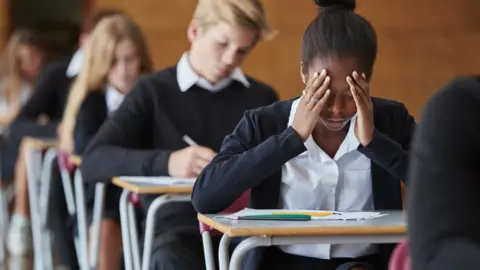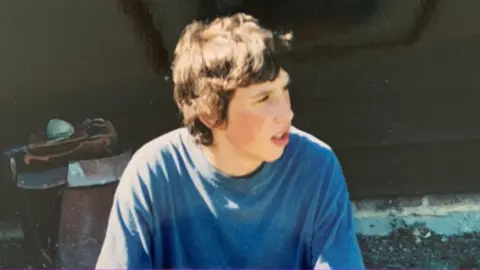Child mental health referrals up 26% in five years, says report
 Getty Images
Getty ImagesThe number of referrals to child and adolescent mental health services in England has increased by 26% over the past five years, Education Policy Institute (EPI) research suggests.
Its report also reveals one in four referrals was either rejected or deemed inappropriate for treatment.
Out of 60 providers questioned, 54 gave a response.
The Department of Health said it was investing an additional £1.4bn into mental health services for children.
The figures, shared with BBC Radio 5 live Investigates, were compiled using Freedom of Information (FOI) requests submitted to child and adolescent mental health services (Camhs) and local authorities in England.
Some providers in England were unable to give the full information requested - 33 supplied data about numbers of referrals over five years.
Based on these figures, mental health referrals for under 18s increased from 157,000 in 2013-14 to 198,280 in 2017-18.
According to data from more providers - 50 in total - for 2017-18 alone, children and adolescent mental health referrals topped 264,000.
'I felt I wasn't taken seriously'
George Hodgson, now 22, experienced problems accessing Camhs when he went for an assessment, after struggling with severe anxiety and panic attacks.
Describing how he felt at the time, George told 5 live Investigates: "I was a complete state, throughout the session I was crying and was having regular intrusive suicidal thoughts."

After being told he would not be seen again for 40 weeks, George was left feeling frightened and that he was not being taken seriously.
He and his family decided they could not wait that long and got help privately.
Two years after the initial assessment, and after receiving no correspondence in the interim, they received a call saying George could now be seen by Camhs.
Reflecting on his experience, George said: "I don't know if I would have coped if private support wasn't there. I'm not sure I would be here today."
'Rejected'
Jo Hutchinson, director of social mobility and vulnerable learners at the EPI, said the research provided little evidence of good news for children.
"While we have seen a reduction in some of the longest waiting times, many children still face a lengthy period of time before they can receive any specialist treatment and the number of referrals into these stretched services is rising."
According to the EPI report, around 55,800 children under-18 did not meet the criteria for specialist treatment after being referred in 2017-18.
Some reasons for excluding them from treatment include:
- self-harm referrals accepted only if accompanied by another mental health condition
- a weight loss of less than 15% from their ideal weight for an eating disorder (although this is against National Institute for Health and Care Excellence guidelines)
- young people must have already engaged with early intervention services and waited a specified length of time.
Many providers also said that some young people's needs should be met by other services, for example if they were homeless or had parents with a substance addiction.
Gaps in youth services
Some local authorities - 27 out of the 111 who responded to the FOI - said they had scrapped services related to the mental health and wellbeing of children over the last eight years.
These included community-based early intervention services, family counselling and mental health support for looked-after children, as well as school-based programmes to support children with mild to moderate mental health difficulties.
Emma Thomas, chief executive of Young Minds, said: "We hear every day from young people who haven't been able to get the help they need from Camhs.
"Crucially, we also need to address the gaps in youth and community services that could provide help early on, before young people require more specialist treatment."
A Department of Health and Social Care spokesperson said: "We are transforming mental health services for children and young people with an additional £1.4bn and are on track to ensure that 70,000 more children a year have specialist mental health care by 2020-21.
"We are improving access to mental health services through schools with a brand new dedicated workforce, as well as piloting a four-week waiting time standard in some areas, so we can better understand how to reduce waiting times.
"We are completely committed to achieving parity between physical and mental health as part of our long-term plan for the NHS, backed by an additional £20.5bn of funding per year by 2023-24."
You can hear 5 live Investigates at 11:00 BST on Sunday and afterwards on iPlayer.
